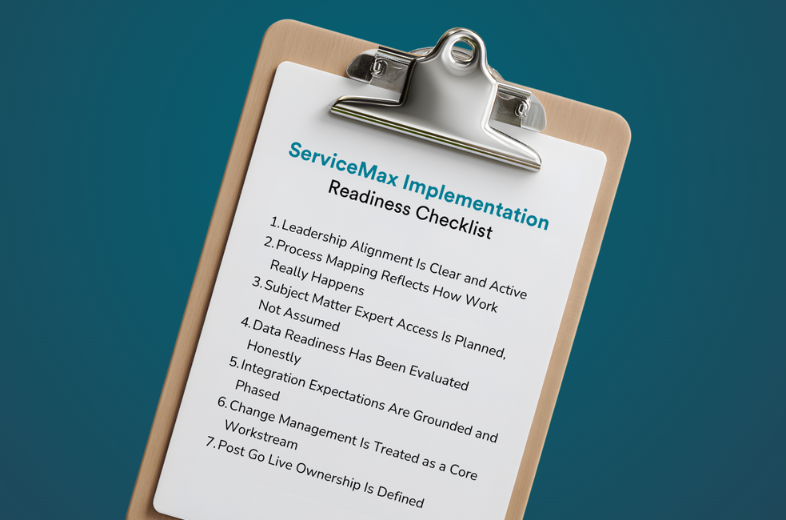A Real-World Look at ServiceNow in Manufacturing

Published Date
For years, ServiceNow has been recognized as a powerhouse in IT service management. But what many leaders in the manufacturing industry don’t realize is that ServiceNow has evolved far beyond IT. It’s now an enterprise operations platform—one that’s being actively used to streamline complex, siloed manufacturing environments and connect operations in ways traditional systems can’t match.
Recently, I worked with a global manufacturer specializing in heavy machinery. Their operations spanned plant floors, dealer networks, and field service technicians, all operating with limited cross-functional visibility. Downtime across assets was costing them real money. Departments weren’t communicating. Data was fragmented. And legacy systems weren’t built to solve these business problems.
That’s where ServiceNow came in.
Unifying Workflows with ServiceNow Connected Operations
The first challenge? Siloed systems and fractured communications. By deploying ServiceNow Connected Operations, the manufacturer was able to break down those silos, creating a single platform to centralize operations data and link plant teams with dealer support, service managers, and field technicians.
They implemented preventative maintenance schedules and asset lifecycle tracking using the ServiceNow Asset Management and CMDB (Configuration Management Database), all while ensuring every department had access to real-time updates through ServiceNow Mobile Agent and SMS-based notifications. This wasn’t just an IT solution, it was an operational heartbeat that allowed every function to move in sync.
Proactive Service with Field Service Management
When it came to field service, this manufacturer didn’t just need dispatching, they needed precision orchestration. ServiceNow’s Field Service Management (FSM) allowed them to:
- Optimize scheduling and dispatching based on technician availability and skills.
- Route field technicians in real time using integrated GPS and asset data.
- Deliver step-by-step instructions through mobile playbooks—complete with images and asset-specific insights.
And because many of their technicians were deskless workers, everything was designed mobile-first, ensuring no loss of context, even on the plant floor or in the field.
Predictive Maintenance and AI-Powered Insights
Beyond operational alignment, the manufacturer leveraged ServiceNow Predictive Intelligence to shift from reactive to predictive maintenance. Real-time asset monitoring combined with ServiceNow’s AI and Now Assist enabled them to:
- Forecast failures before they happen.
- Trigger automated work orders.
- Summarize incidents and work history using Generative AI.
This not only improved uptime but also reduced technician workloads and accelerated response times—all key KPIs in a manufacturing context.
Delivering the Amazon Experience with Customer Workflows
Customer expectations are changing. Today, even in B2B manufacturing, clients want a seamless, frictionless experience—what I call the “Amazon standard.” With ServiceNow Customer Workflows, we delivered:
- A portal where customers could see asset entitlements, service history, and make requests.
- Real-time SLA scorecards and service-level transparency.
- Self-service capabilities that reduced support tickets while boosting satisfaction.
That’s not just customer service, it’s customer retention.
What Sets ServiceNow Apart from Traditional CRM Tools?
Unlike legacy CRM systems that bolt together sales, service, and operations through disconnected modules, ServiceNow runs on a unified data model. That means:
- Sales, installation, field service, and renewal workflows all live in one place.
- Every stakeholder, from sales reps to service managers, shares the same operational truth.
- AI agents (via Now Assist) can guide tasks, recommend actions, or even execute scheduling playbooks autonomously.
This manufacturer didn’t just replace software, they replaced inefficiency with agility.

Final Thoughts: Why Manufacturers Should Look Beyond IT
The biggest misconception about ServiceNow? That it’s “just an IT ticketing tool.”
The truth is: ServiceNow is an end-to-end operations platform, especially suited for complex manufacturing environments. From connected operations and field service to customer experience and predictive analytics, it’s helping organizations rethink what’s possible on a single platform.
If you’re a manufacturer looking to unify workflows, reduce downtime, or just give your teams tools they actually want to use, start with this question: Why now?
And if your answer has anything to do with visibility, agility, or customer loyalty, then ServiceNow might just be your next competitive advantage.
Looking to optimize your manufacturing processes with ServiceNow?
Book a meeting with our ServiceNow experts today.



.png)
